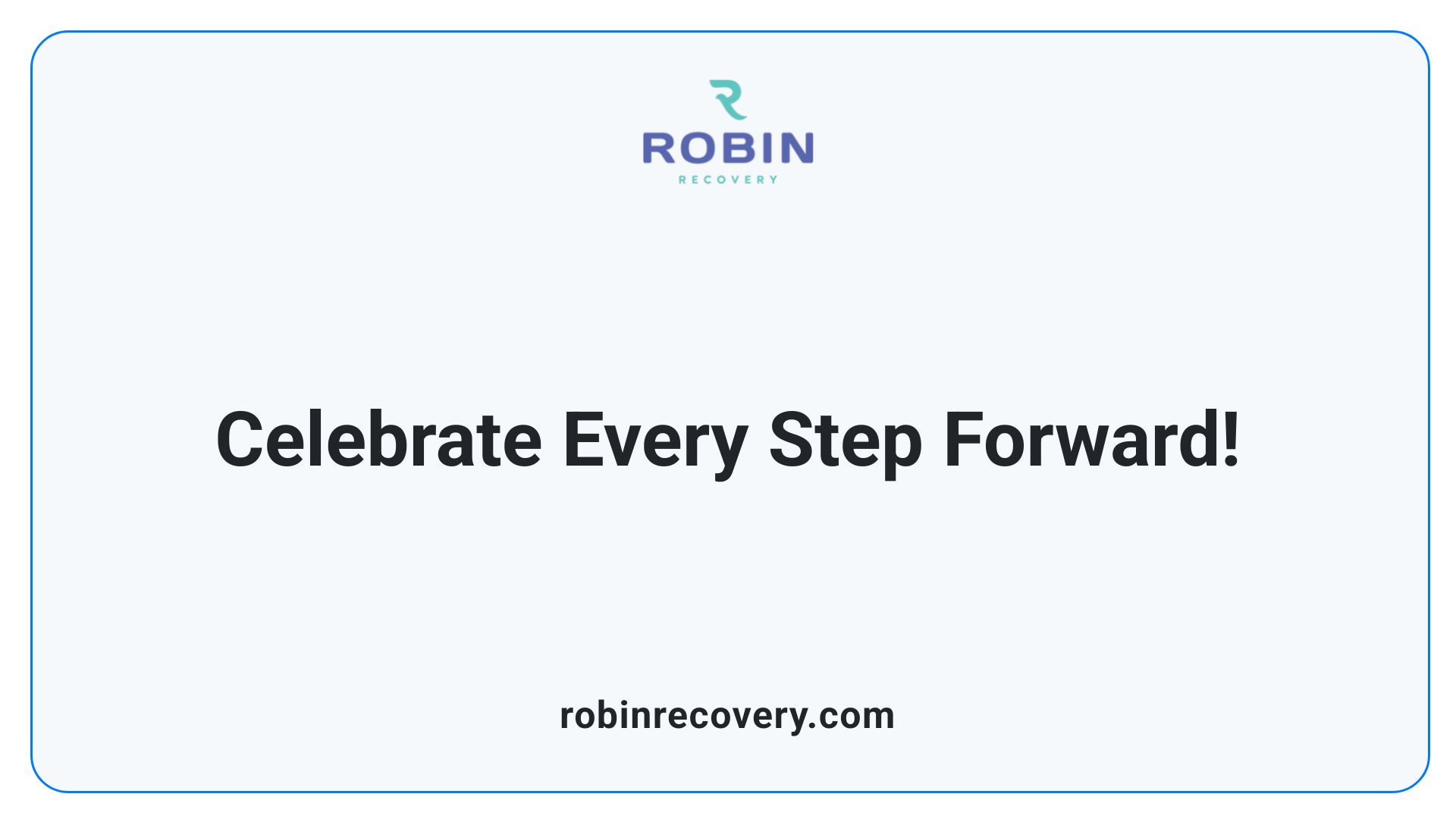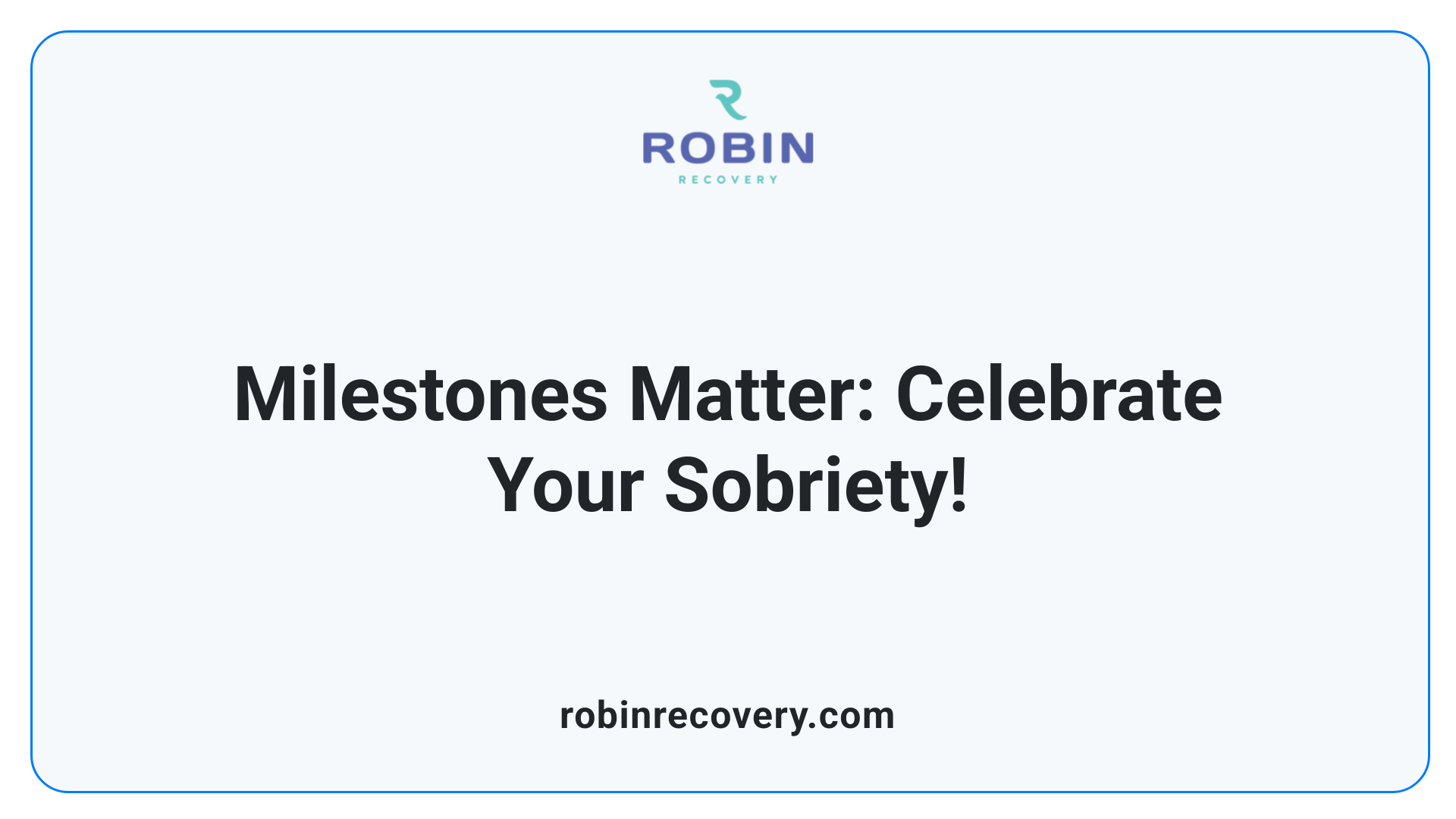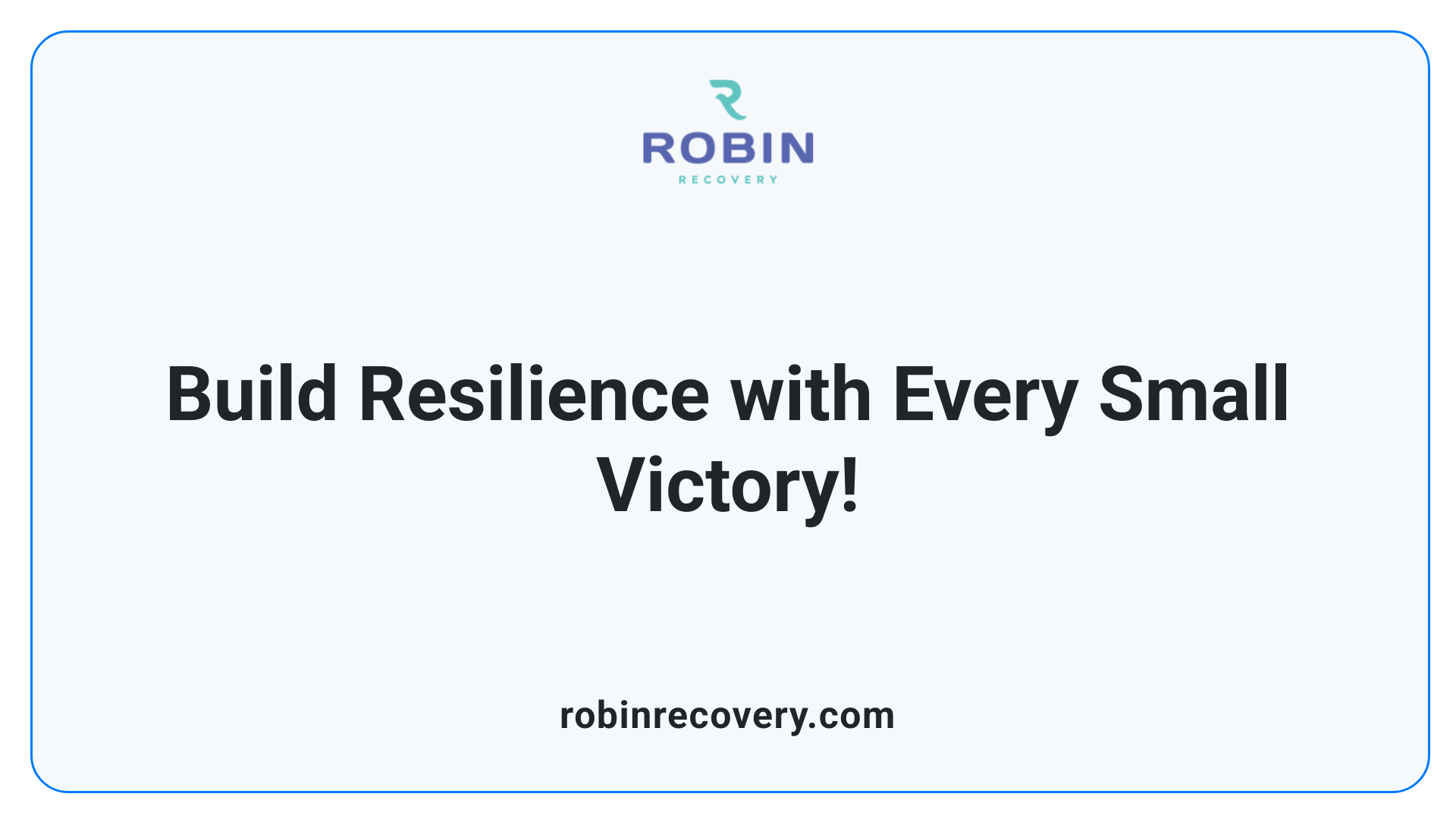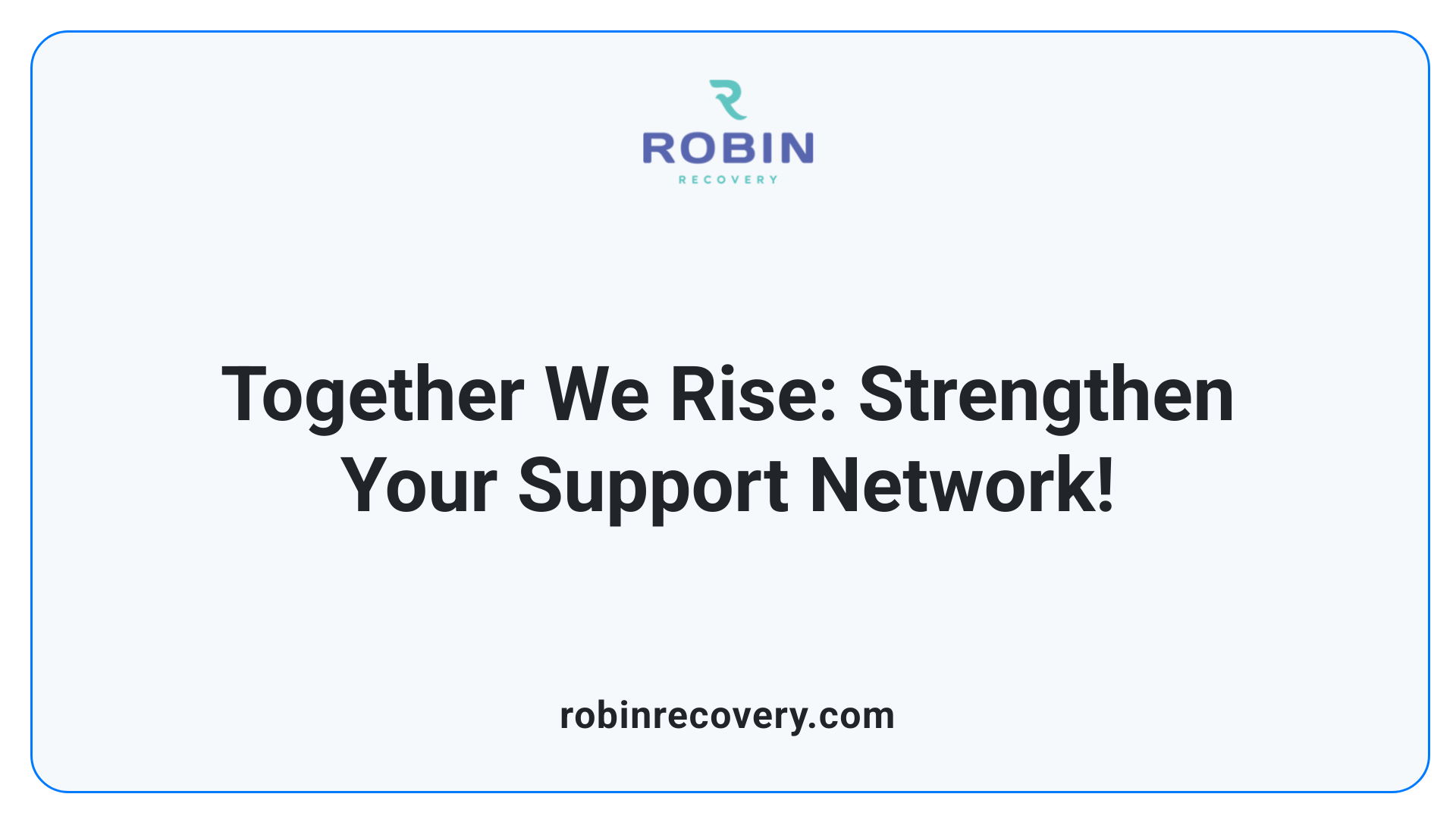How to celebrate small wins in recovery

Introduction
In the challenging journey of recovery, celebrating small victories is often overlooked yet significantly impactful. Recognizing these achievements can provide a motivational boost and promote a healthy mindset, leading to lasting change. Understanding how to commemorate these milestones helps in nurturing self-compassion, building resilience, and maintaining focus on the journey forward.
The Power of Celebrating Small Wins

Importance of Small Victories in Recovery
Celebrating small victories plays a vital role in the recovery process. Each small achievement, whether it's staying sober for a day or attending a support group, is a testament to an individual's progress. These victories cultivate a positive attitude towards sobriety and remind individuals that change is achievable, even amidst challenges. By focusing on these successes, individuals can shift their mindset from negativity associated with addiction to a more uplifting perspective on their journey.
How Acknowledging Progress Boosts Motivation and Confidence
Recognizing and celebrating small milestones is essential for boosting motivation. When individuals take note of their progress, they reinforce the belief that their efforts yield results. This acknowledgment helps counter feelings of hopelessness and enhances self-esteem, which are critical during recovery. Furthermore, sharing these achievements with a support network amplifies their impact, as encouragement from others fosters resilience and motivation to keep pushing forward.
Methods for Tracking and Visualizing Achievements
To effectively celebrate small wins, incorporating various tracking methods can be beneficial. Here are a few practical approaches:
Method Description Benefits Journaling Keeping a written record of accomplishments. Visualizes progress and reflections Win Wall Creating a visual display of achievements. Reinforces motivation and pride Goal Setting Defining specific, measurable small goals to achieve. Focuses efforts and tracks progress Celebratory Rewards Treating oneself for reaching small milestones. Enhances emotional well-being
Implementing these methods not only aids individuals in acknowledging their growth but also strengthens their commitment to the recovery journey.
Effective Celebrations for Sobriety Milestones

What are effective ways to celebrate sobriety milestones?
Celebrating sobriety milestones is essential for reinforcing commitment to recovery and acknowledging personal achievements. Here are some effective ways:
- Pamper Yourself: Treat yourself with a spa day, buy that book you've been wanting, or engage in your favorite hobbies.
- Organize Gatherings: Celebrate with family and friends by hosting a small gathering or dinner party. Sharing these moments strengthens bonds and enhances feelings of support.
- Share Your Story: Opening up about your recovery journey can inspire others. You might consider speaking at a meeting or writing a blog post.
- Reflect on Your Journey: Take time to jot down accomplishments in a journal. Celebrate every minor victory, such as a week of sobriety or healthy choices made.
- Express Gratitude: Thank those who've supported you during your recovery. This could be through a heartfelt letter or a simple phone call.
- Set New Goals: Use these milestones as a springboard for future goals, envisioning the progress ahead.
- Unique Celebrations: Consider giving back to the community by volunteering or taking a special trip as a reward for your hard work.
These celebrations not only enhance motivation but also foster a positive environment that encourages continued sobriety.
Fostering Self-Compassion and Resilience Through Small Wins

How can small victories contribute to self-compassion and resilience?
Small victories contribute significantly to self-compassion and resilience by reinforcing a positive self-perception and instilling a sense of competence. Recognizing these small wins encourages individuals to view their efforts as valuable and worthwhile. When individuals track their achievements, they cultivate intrinsic motivation and self-trust, essential qualities for navigating tough challenges in recovery.
Acknowledging small victories shifts focus from setbacks to progress. Instead of dwelling on failures, individuals learn to celebrate their journey, fostering a kinder relationship with themselves during difficult times. Practicing self-compassion—treating oneself with kindness and recognizing shared human experiences—plays a critical role in enhancing emotional resilience.
Engaging with small achievements nurtures a cycle of positive reinforcement. Individuals receive motivation from these moments of celebration, further emboldening their commitment to recovery. This process builds emotional well-being and fortifies the individual’s ability to overcome future challenges. By intertwining small victories with self-compassion, individuals create a robust foundation for ongoing recovery, paving the way to achieve larger goals.
Practical Ways to Commemorate Progress

What are practical methods to commemorate and appreciate small progress in recovery?
To commemorate and appreciate small progress in recovery, start by keeping a "ta-da!" list where you jot down completed tasks or activities. This list provides tangible evidence of your achievements, giving you something to reflect on and celebrate.
Additionally, set aside moments during the day to reflect on your accomplishments. This practice can foster a positive mindset and significantly boost your motivation. Consider journaling about your recovery journey, detailing both small wins and significant milestones.
How can gratitude play a role in these celebrations?
Incorporating gratitude into your daily routine can enhance this reflection. Take a few minutes each day to note things you are thankful for, including the progress you’ve made, supportive people in your life, or even simple joys like a pleasant walk or a good meal.
What role do rewards play in maintaining motivation?
To further motivate yourself, think about rewarding your efforts. This could be as simple as treating yourself to a favorite food, enjoying a relaxing day out in nature, or indulging in a long-awaited activity you enjoy. Rewards reinforce positive behaviors and remind you that each step taken toward recovery is worth celebrating.
In summary, breaking down larger goals into smaller milestones can help facilitate frequent recognition of your journey, firmly keeping you focused and motivated as you navigate through recovery.
Building a Supportive Environment for Celebrating Wins

Role of Support Networks in Recovery
Support networks, including friends, family, and recovery groups, play a crucial role in celebrating small victories during the recovery process. These networks provide emotional support and encouragement, which can significantly enhance motivation. When individuals share their successes, no matter how small, they invite others to participate in their journey, creating a sense of belonging.
Strengthening Bonds Through Shared Achievements
Celebrating wins together not only fosters individual motivation but also strengthens bonds within the support network. By acknowledging each other’s achievements, individuals reinforce their connections. This celebration through shared experiences leads to a community of supporters who are actively engaged in one another’s recovery processes. The joy of collective victories can elevate confidence and boost morale, allowing individuals to face challenges with renewed strength.
Creating a Non-Judgmental Environment for Growth
Establishing a non-judgmental environment is essential for individuals in recovery to feel safe sharing their wins. Such an atmosphere encourages honest discussions about struggles and triumphs. When individuals know they can celebrate their progress without fear of criticism, it fosters openness and vulnerability. This supportive environment enables them to acknowledge their small victories and empowers them to continue striving for larger goals.
How does sharing victories with support networks enhance recovery?
Sharing victories with supportive networks enhances recovery by fostering a sense of community and validation. This collective celebration helps individuals feel understood and valued, which is vital for maintaining motivation during difficult phases of recovery. Furthermore, sharing achievements encourages others to recognize and applaud similar victories within themselves or the community, reinforcing a supportive and motivating environment. This practice strengthens bonds among individuals and highlights the importance of collective resilience and shared experiences in the recovery journey.
Conclusion
Celebrating small wins during recovery is a multifaceted approach that emphasizes progress over perfection. By focusing on incremental achievements, individuals can build resilience, foster self-compassion, and maintain the momentum needed for long-term recovery. Whether through private reflection, rewarding oneself, or sharing milestones with a supportive community, these practices are essential in cultivating a positive and resilient recovery pathway.
References
- Celebrating the Small Wins in Recovery - Sanctuary Centers
- Addiction Recovery: How to Celebrate the Small Victories!
- The Importance of Celebrating Small Victories in Sobriety
- The Importance of Small Victories in Recovery
- Celebrating Milestones in Recovery: Small Victories, Big Confidence
- Thankfulness in Recovery – celebrating the small wins
- Celebrate Your Victories, No Matter How Small - SMART Recovery
- Small Wins in Recovery: Why Celebrating Progress Matters
- Celebrate Your Successes! - Olalla Recovery Centers
- Celebrating Small Wins During the Recovery Process
